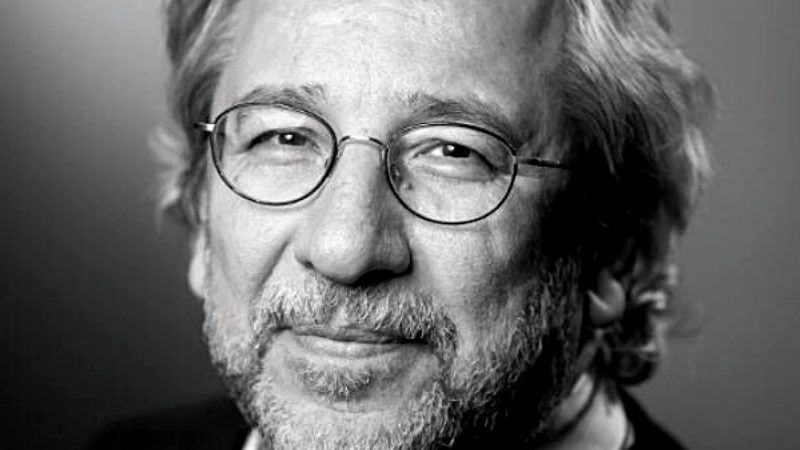A court in Turkey has sentenced journalist Can Dundar to more than 27 years in prison for allegedly supporting terrorism and military or political espionage.
Dundar, the former editor-in-chief of Turkish daily newspaper Cumhuriyet, has been a target of President Tayyip Erdogan’s regime since publishing a story about Turkish arms shipments to rebels in Syria in 2015.
The court in Istanbul handed down its verdict on Wednesday condemning the journalist to 18 years and nine months for obtaining secrets for the purpose of political or military espionage. He was also sentenced to an additional eight years’ imprisonment for supporting an armed terrorist organisation without being a member.
Turkey is known as one of the world’s worst jailer of journalists, according to several reports by international press freedom and human rights organisations. The ruling in Turkey prompted criticism from Germany, but Dundar’s home country is demanding his extradition.
Neither Dundar nor any of his defence lawyers were present during the sentencing. “We do not want to be part of a practice to legitimise a previously decided, political verdict,” the lawyers said in a statement before the hearing.
#Turkey @RSF_inter condemns today’s insane and shocking decision by a court to sentence journalist #CanDündar to 27 years in prison which confirms that President #Erdogan regime is unable to halt its headlong flight into ever-greater authoritarianism https://t.co/mA4tDcpQHa pic.twitter.com/Zs9pfCgX1m
— RSF (@RSF_inter) December 23, 2020
The journalist has been living in Germany in exile since 2016. He fled his country during Erdogan’s crackdown on journalists after a failed coup.
In comments to the press, Dundar said he was not surprised at the verdict. “They wanted to punish me because of this true story and at the same time try to intimidate other journalists in Turkey who dare touch that kind of sensitive issue,” he said in a comment to DW.
He said the Turkish judicial system is now almost totally under Erdogan’s control and he sees no point in fighting for an appeal. The journalist still intends to take his case before the European Court of Human Rights.
Dundar’s defence team slammed the verdict saying the charges are politically motivated.
They had also requested that the Judges handing the verdict be replaced to ensure a fair trial. The court rejected the request.
Upon entering Germany in 2016, Dundar was given 15 days by the Turkish authorities to return and face justice. The journalist refused, at which point the courts in Turkey declared Dundar a fugitive.
His assets, including four properties and all bank accounts in his name, were frozen. His wife, Dilek Tukrer Dundar, had her passport confiscated.
The journalist only managed to be reunited with his wife last after she managed to flee Turkey without a passport and reach her husband in Berlin. The two had not seen each other for more than three years.
Erdogan had publicly warned Dundar that he would pay a “heavy price” for exposing Turkish intelligence.
Speaking at an award ceremony by the Committee for the Protection of Journalists (CPJ) in 2016, Dundar referred to his time in solitary confinement in a Turkish prison when he was jailed for his reporting.
He mentioned the 140 journalists locked up in Turkish prisons – 10 from his own paper, Cumhuriyet.
“Behind the grim statistics stand human beings, some of them my friends, with their lives interrupted and their fates uncertain. We have fought together for years for our right to freedom of the press and the public’s right to be informed,” the journalist said during his acceptance speech.
Dundar’s problems with Erdogan’s government began when his newspaper published a story titled, ‘Here are the weapons that Erdogan said do not exist’ in May 2015. The story was supported by photos and videos showing Turkish intelligence supplying weapons to Syria.
Reacting on Twitter, Dundar said these penalties have no effect. When democracy is regained, he said, all of them will be erased and the real criminals will be punished. “That’s why we wear every punishment as a medal on our chests,” he wrote on Twitter.
Bu cezaların hiçbir hükmü olmadığını, yeniden demokrasiye kavuştuğumuzda hepsinin silinip atılacağını, o günden sonra gerçek suçluların cezalandırılacağını biliyoruz. O yüzden kesilen her cezayı göğsümüze madalya diye takıyoruz. https://t.co/HQRddtKaTO
— Can Dündar (@candundaradasi) December 24, 2020
International press freedom NGO Reporters Without Borders (RSF) has condemned what it described as an “insane decision” by a Turkish court. The organisation also called on the judicial authorities to quash this conviction.
It said that this decision confirms President Erdogan’s inability to halt his regime’s headlong flight into ever-greater authoritarianism.
The German Journalists’ Association also denounced the verdict as an “act of barbarism”. “Dundar has investigated, reported and exposed. That is good journalism, not a crime,” the association said in a statement.












